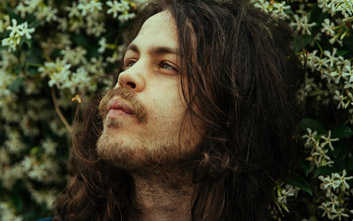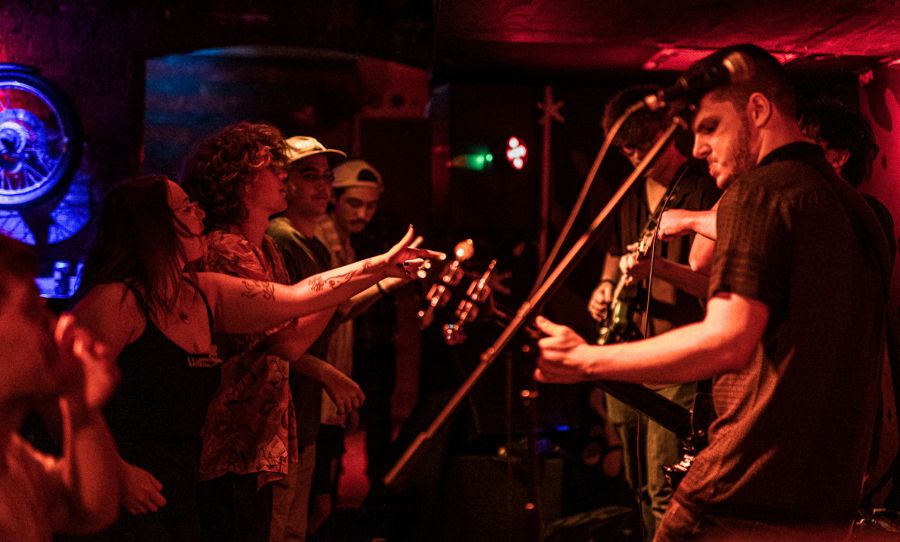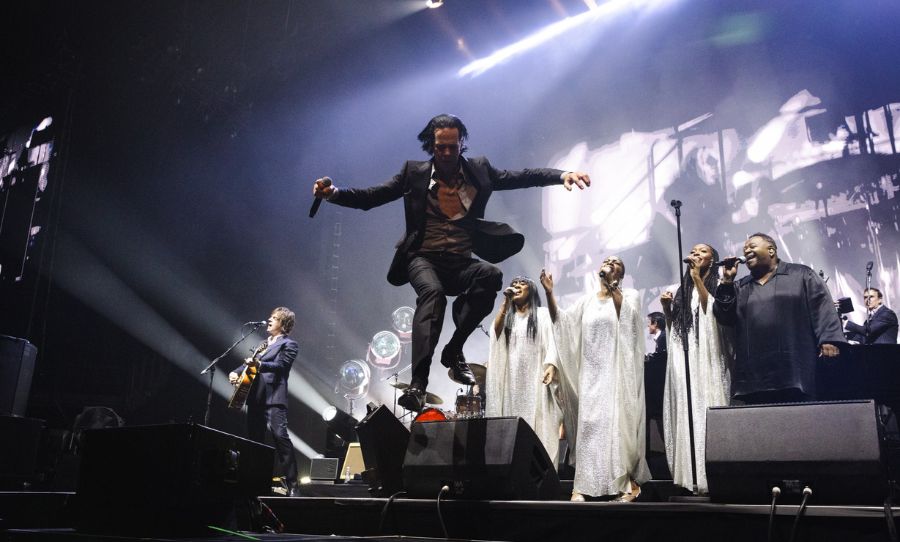It’s hardly rare to chat about an unreleased record with an artist. What is rare is chatting to an artist about an album with no release date.
Sydney’s Raindrop, the solo project of production wunderkind Miles Devine, is the reason I found myself having my first chat of this ilk. With the finished yet unpublished album Mild Meltdowns, Raindrop entered Happy Mag’s Needle in the Hay vinyl competition and scored third place.
Obviously the album tickled us in the right places, and since then we’ve learned that Raindrop operates out of a frankly mouthwatering home studio. In light of this, we caught up with Devine at Young Henrys to discover more.
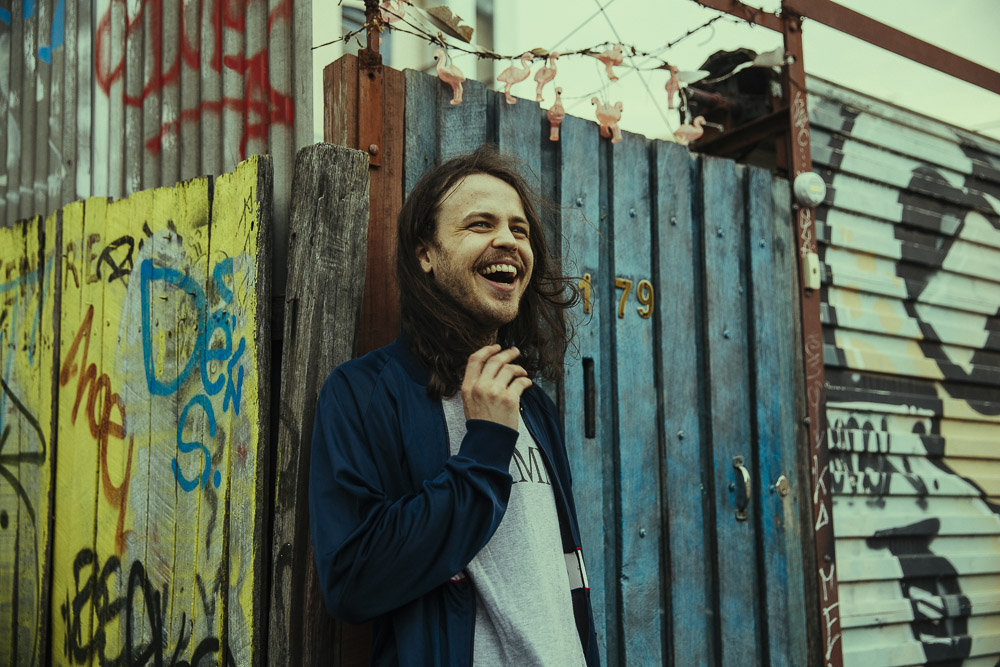
A proven production whiz with an affinity for yesterday’s tools, there’s a distinct flavour to Raindrop which just keeps us coming back.
HAPPY: So we’re going to be talking a lot about an unreleased album, which is kind of weird.
MILES: Yep.
HAPPY: But let’s go with it. We’re obviously a fan of the album so, how long has Mild Meltdowns been in the works?
MILES: It started a long time ago, like some of the songs that I wrote in Raindrop when I first started it in 2013, they sort of carried through and I basically spent all of last year averaging five days a week and probably 10 hour days in the studio. I had to do it, because I wanted to give myself enough time to make a record I was 100 percent about, and that was the only way. Basically I locked myself away, and went a bit crazy… we started in February and I finished it on Christmas Eve with SPOD. Now I’ve been sitting on it and seeing what happens.
HAPPY: Sounds like the editing process was real serious.
MILES: I was using up a lot of hard drive space, it was ridiculous. As far as editing went, I was mostly tracking until I was happy, to the point where we actually did all the drums and the bass in the first four days of recording, then I took it off the tape, played around with it a bit, did a few speed changes, stuff like that. A lot of my editing process is basically working with the tape machine, I have a thing where I deliberately don’t record drums at the right speed so I can find the right spot with the tape machine and go from there. Some of the hard part at the start was getting a song off, then I’d track it, then it’d be at the wrong speed and I’d have to start again, because all the instruments were pitched differently. There was a lot of that going on, where I had to just make decisions. I have this theory with it, I restricted myself to just those drum takes because I wanted to have something that I couldn’t control, because the rest of it was over-control.
HAPPY: I really like that, and I’ve heard that point before. You do need to afford yourself something that you can’t change, otherwise there’s too much temptation to.
MILES: Yeah, exactly. There were moments where I freaked out and thought ‘I should re-record this’ but I just stuck at it and used more of a production approach to fixing those things that weren’t there, or making the vibe right.
HAPPY: You said you finished it on Christmas Eve, which means you’re going on a year. Do you worry about it dating at all? I know a lot of stuff goes through a release schedule like that, but there’s definitely this huge lo-fi, psych thing going on in Sydney right now… do you worry?
MILES: As I was tracking it, I thought about that a bit. I didn’t really listen to much music last year, I zoned out so I wouldn’t worry about that. But all that stuff’s been around for long enough in my ears that there’s always going to be a time for it. I see a lot bands do that, where they release a record, and they rush it, and they release it too early and it becomes this thing that doesn’t get the attention it deserves. The objective was to make it good enough that I wouldn’t worry about that. And at the end of the day with timing stuff, there’s a big world and I try to think of myself as being removed from it. Having to cater for that, it would have gone against the mojo of what I was doing.
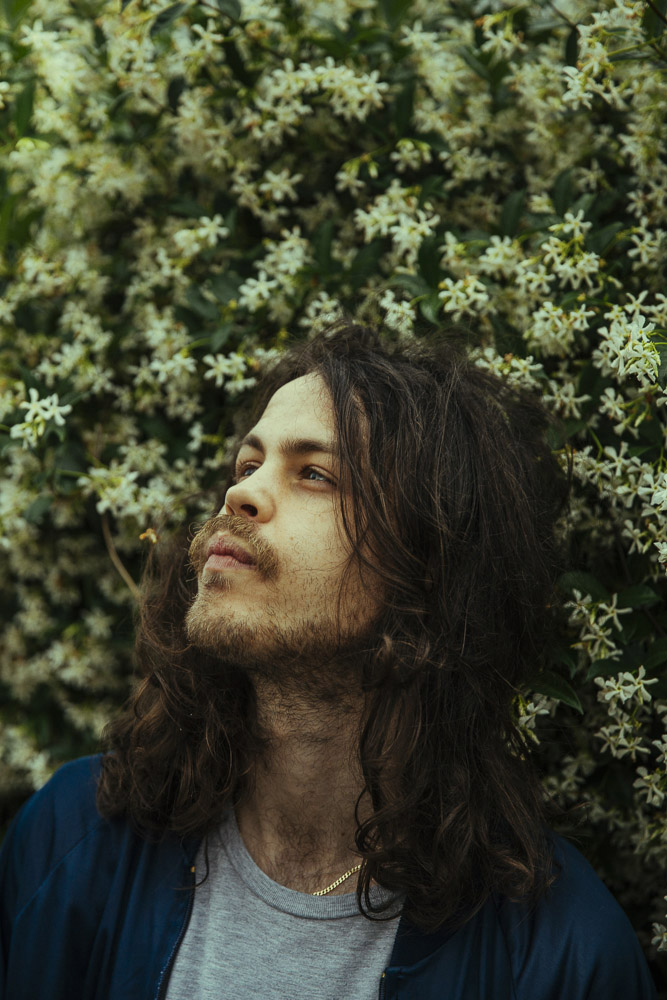
HAPPY: You seem very chill about it, which I like. Too often, people are the opposite.
MILES: Well there’s definitely a part of me that wants that. Like, a lot of my friends ask me for it and I haven’t even sent it to people, because I want it to be exciting when it comes out. If you put a year’s work into something and then rush the most important part, it seems a bit counterproductive.
HAPPY: As for the content of the album, you say you went a little crazy recording it. Is that… craziness, I guess, a theme to Mild Meltdowns?
MILES: Yeah, the album has been an outlet for me to write about things that, in hindsight, aren’t very big deals. So what I refer to as a meltdown are all the things that I go into in the album, but they’re only mild because they’re stupid things. Literally writing about stupid things to write about. I took my life which is… I live with my girlfriend and my cat, I write about everything around me and it’s usually those two. A lot of it is breaking down over things that are just not that big of a deal.
HAPPY: I want to talk about your home studio a little, about what it means to you having that. When did this studio setup at your house get started?
MILES: It started just after I recorded the first Raindrop EP in 2013. We recorded it at REC Studios, the old 301, so we did that in one night and it was one of those high-pressure environments but you know, going through some of the best gear. At that time I learnt about what that meant and what that did for my sound. And I recorded half of it at home, so it seemed the most logical thing to do was to start setting up a studio for myself. At the time a friend of mine basically quit music and gave away all his gear, he gave me a 16-channel tape machine and from then, because it was something I would never have thought of getting, I ended up building all this gear around it.
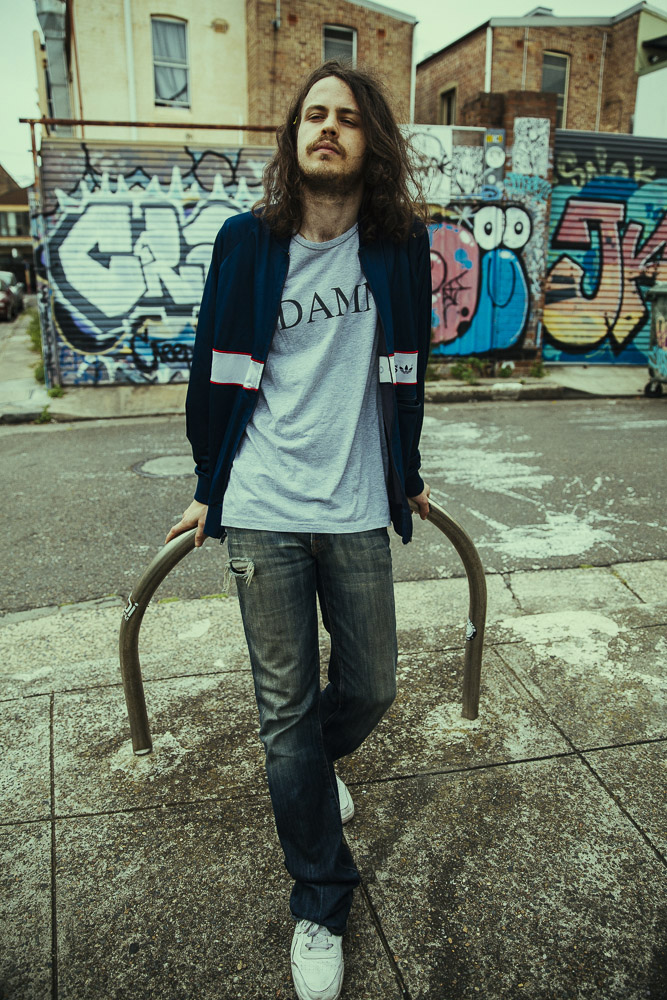
From having a one-room studio with a desk and some crappy interface I’ve gone and got a console and a tape machine, and I started to realise that if I invest money into that, I’ll have a space that allows me to create freely and not worry about the stresses of a big studio. Also, a lot of my favourite albums were recorded in homes. There’s a special vibe there. Now it’s my little fortress, and I’ve got no restrictions. It also got me to a point where I had no excuses not to make a record because I have all the stuff that I need now. And it’s a nice place to be in, that I’m super appreciative of.
(At this point Miles waves to someone behind my head)
HAPPY: Wait, is someone there?
MILES: There is someone. Believe it or not, I’m actually buying a Nintendo Wii off that gentleman in the car over there. He’s come to meet me, but he’s a bit early.
HAPPY: (laughs) Classic.
MILES: That is a true story. You can put that in the interview if you want.
HAPPY: I will. Shoutout to Nintendo.
MILES: I was sort of hoping he’d turn out during the interview (laughs).
HAPPY: That’s definitely a first! So I was going to ask… you’ve lent your studio space to a couple of Sydney bands as well, haven’t you?
MILES: Yes.
HAPPY: Who are some of those people?
MILES: I recorded Egoism’s EP, that was probably the first thing I did working as a professional. I started out recording a song of theirs called Crowd, they were the first band I ever said “come in, I’ll basically record a song for free” and they did. Since then Curt Manor, Tim who plays in my band, recorded his EP there. And there have been albums recorded there that are still waiting to be released.
HAPPY: Like yours!
MILES: Like my one! There’s a friend of mine, they have a group called Lee Sullivan and the Sleepers, they recorded a full length LP there before I recorded Mild Meltdowns but he’s actually slower than me. That album I was producing with him and I’m very proud of it. There’s a lot of stuff done in there that hasn’t surfaced yet that I’m super keen for people to have a listen to.
HAPPY: Is that an endgame for you? Working professionally?
MILES: Yeah, ideally in 10 years from now if I can make any form of a living from it and be known as that, I would do it for sure. It’s one of those things, at the moment I’m just doing it in a way that pays for the studio to stay alive. To get to the point where I’m getting paid as my job, that would be my ideal life. But in that journey, I don’t want to go too quick, I want to make sure I do all the right things. Right now I’m just trying to learn from people how to be the best producer. It’s very different to producing your own music, because with your own work you can kind of disregard everyone else, but being a producer where you’ve got to help other people with your own ideas and keeping in mind that it’s their baby, it’s a different headspace to get in. You’ve got to be a little more open minded.
HAPPY: So you’re more interested in the classic producer role, rather than the invisible yet apt engineer?
MILES: Yeah, I think that’s where I see it going. But I feel like Raindrop’s a good platform for me to express my production, and when people hear that it will be the thing that entices them to want to use me as a producer. But it’s another thing, I need to get to a point where I’m confident that I can do the best for them too.
HAPPY: You said you record on tape, and you started because you were given a tape machine. I don’t think a lot of people would make that decision on their own.
MILES: Well it was a bit of a surprise. There’s lots involved in a 16-track tape machine that I wasn’t aware of.
HAPPY: I bet.
MILES: And I just went in. The thing that enticed me the most about tape is that the performance aspect is very different. Like when you get a band in, or when you’re doing your own stuff, if you’ve got the pressure of the tape rolling, we’re not just going to do take after take here. Because it’s like 250 bucks for a roll of tape that lasts half an hour, and every time you go over that it deteriorates a bit. And that’s alright, sometimes.
(Miles’ gaze turns towards his new Wii)
HAPPY: I’ve actually been thinking about grabbing one…
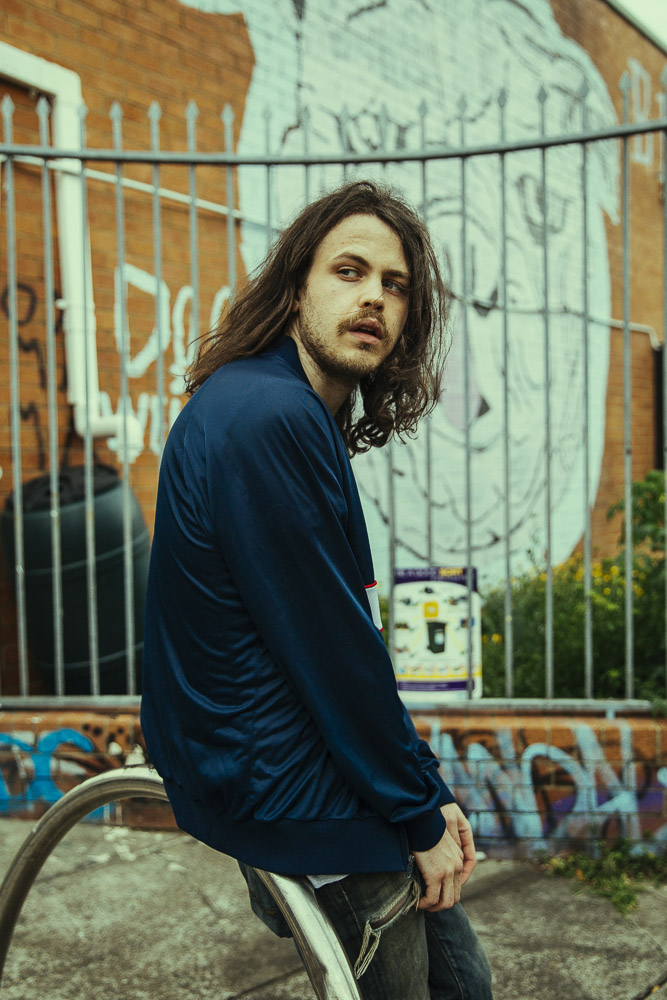
MILES: It’s weird! In the last year of my life I’ve had this rekindling of a childhood love for old games. I feel like everything’s gone backwards for me there, I used to be very anti-gaming, and now I’m like ‘it’s actually really fun’.
HAPPY: It was only as an adult that I finally finished Ocarina of Time. I never did as a kid because it was so brutally long.
MILES: (laughs) And now all games are so hugely long, it’s such a huge time investment. I started loving games though because I noticed that Flying Lotus, he’s a hero of mine, he’s really into gaming. I saw that he did a radio station on Grand Theft Auto V and I was like ‘I’m getting a PS4’. It goes hand in hand with studio life, I’ve got one of my TVs with my console up, so I can just switch over to game mode. I didn’t have that while I was recording the album though, on purpose.
HAPPY: Speaking to you and hearing your stuff it seems like a lot of what you do is grounded in the past… is it purely a physical, ‘how it sounds’ thing that draws you to that or is there a romantic side to it too?
MILES: Oh it’s definitely romantic, I mean I’ve collected records since I was like 15. Since I started building up records I started getting old hi-fis, I got really into that and then that translated into the gear world where one of the first things I got was a [Roland] Space Echo. I’m just as impressed with a lot of new stuff, like one of my favourite things ever is the Teenage Engineering OP-1 which is super futuristic, so ahead of its time but I can still be as romantic with it as I am with my MiniMoog, which is as romantic as it gets. It’s definitely a beautiful, spiritual thing for me. A bit of a freaky love thing.
HAPPY: Now you have been recording since December, after Mild Meltdowns was dusted off. Are you adding to the album, or looking to release something in the interim?
MILES: Well I’ve been writing songs in a Raindrop headspace. Mild Meltdowns was very much an album in my head, but there’s songs I can now write and record that feel like Raindrop songs. For an example, since I finished Mild Meltdowns I’ve been really interested in challenging myself to record with drum machines only. Just after I finished the record I bought myself an [Akai] MPC-60 and an [E-mu] SP-12 with the intention of scrapping a drummer for the next year. It’s been a learning process, but the cool thing about using that old gear is that I can incorporate synthesisers, so I’m now doing more stuff that’s sequenced. Like sequencing my MiniMoog.
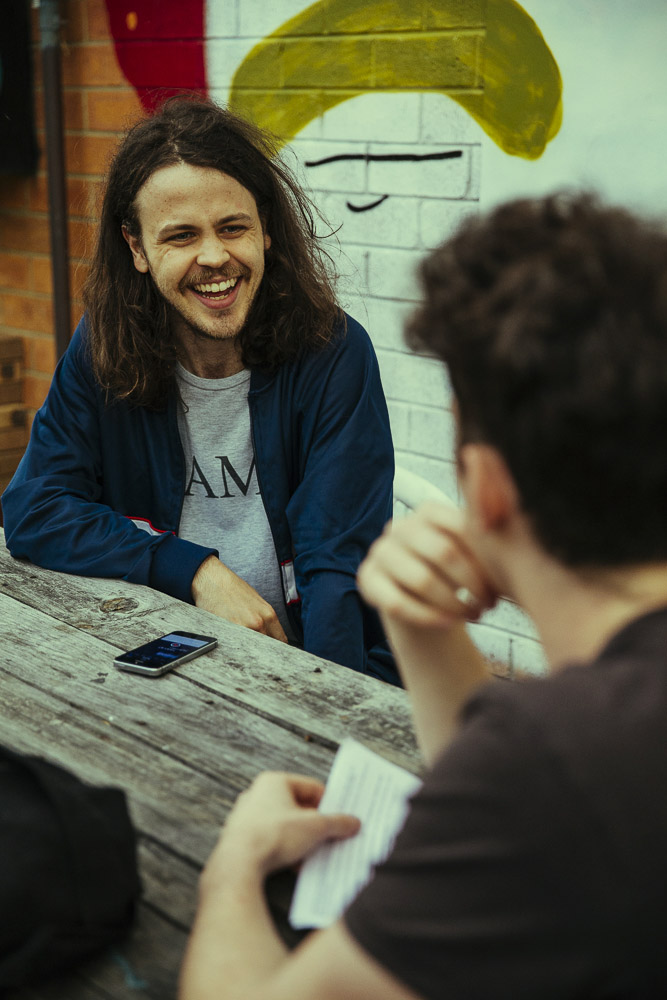
HAPPY: Because you don’t have eight hands.
MILES: That’s right. So the next challenge for me is to be able to write songs and be able to sequence and pattern them on an MPC and then basically have a whole workstation based around this late ‘80s setup of silliness.
HAPPY: Love it.
MILES: It’s a weird thing because I record on a computer and we’re always constantly wanting a faster computer to do our work, and my solution to that is to buy a piece of gear that only takes floppy discs and has 13 seconds of sample time. When I finished Mild Meltdowns, I felt like I was almost too spoilt and didn’t restrict myself enough. So the idea of the next stuff is to give myself more limitations, because that sometimes gives way cooler results.
HAPPY: Sounds like you’ll never stop.
MILES: It’s only going to get more silly.
Keep a keen lookout for Mild Meltdowns come 2018, and check out Mindfield Studios for Miles’ production work.
